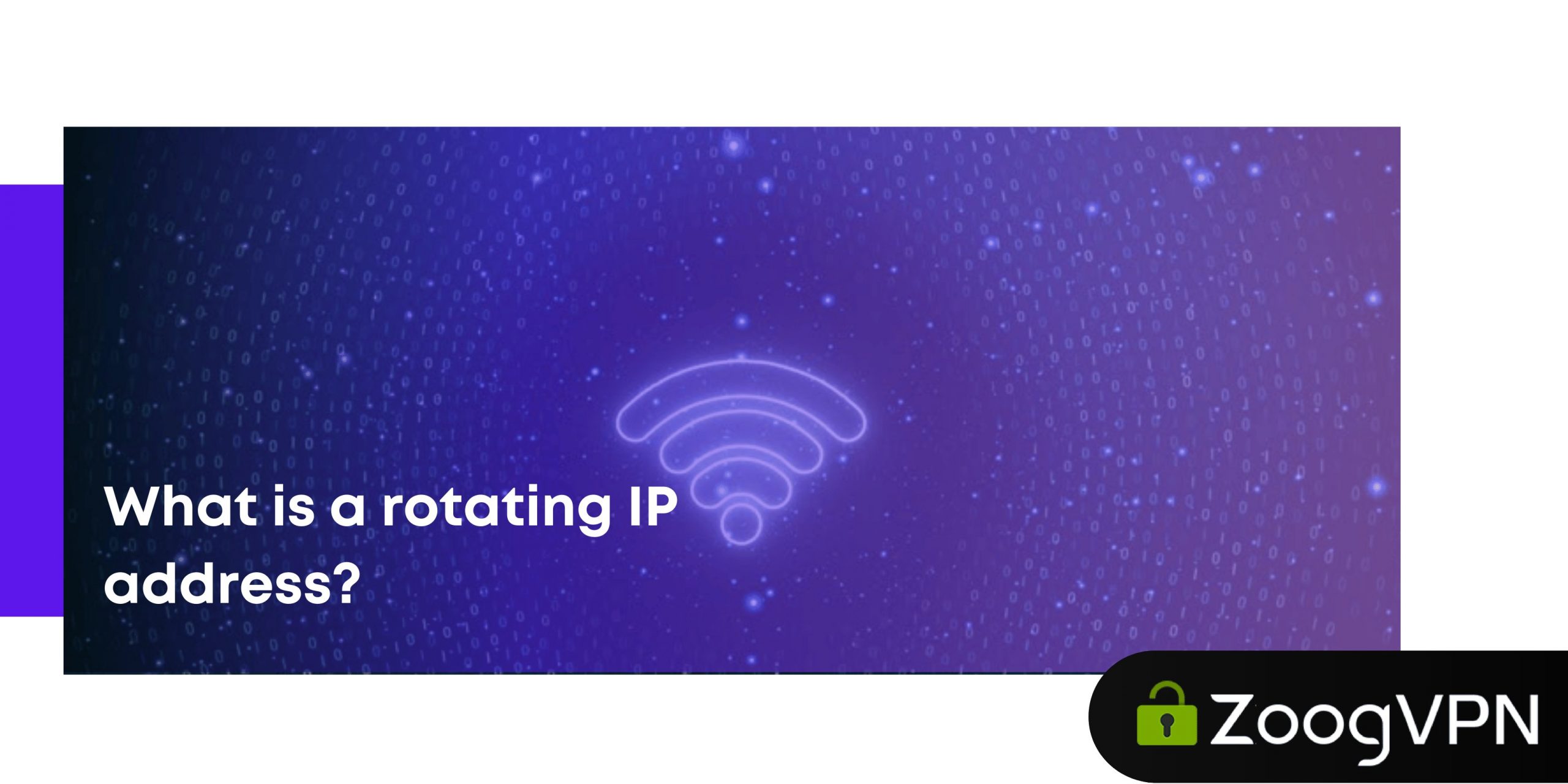Quick answer: Rotating IP addresses are those that regularly modify or are selected randomly for each new connection to a website. This technique is widely adopted for handling IP-based restrictions or bans or distributing network traffic to avoid overloading a single IP address.
The concept of a rotating IP address seems like a pretty refreshing solution for online privacy, which keeps getting harder to achieve from year to year. To describe this in brief, imagine your IP address as your digital address in the vast internet neighborhood. Now, picture that address changing regularly, making it a bit like having a top-secret hideout with a constantly modifying location.
An IP-shifting strategy can keep prying eyes guessing your genuine IP and potentially save your online activities from the pesky advertisers and data collectors. In essence, a rotating IP address offers a dynamic layer of anonymity and security. It can be compared to gaining a hidden, anonymous identity on the Internet, and speaking of secrets, why did the IP address go to therapy? It had too many issues with its past connections!
So let’s answer what a rotating IP address is, disclosing its concept, benefits, and use cases in terms of your online safety!
What is a rotating IP address
IP address rotation is a process where your IP address, the unique identifier of your device on a network, changes at scheduled time periods, after a certain amount of requests, or each time you connect to the internet. The IP rotation service can be carried out by your internet service provider (ISP), a VPN, or a proxy service. It aims to keep your online activity from prying eyes, avoid IP blocking, or balance network traffic. When considering this aspect from a business context, rotating IPs may be a part of a load-balancing or failover strategy.
What is proxy rotation?
Proxy rotation refers to the practice of frequently changing the IP addresses used by a proxy server. Proxies serve as intermediaries between a user’s device and the internet, concealing the actual IP address and creating facilities for anonymous browsing or access to restricted content. Proxy rotation implies using a pool of different IP addresses, which are cycled through at set intervals or based on certain conditions.
The core benefits of proxy rotation refer to excellent anonymity, as it restricts websites from tracking user behavior, and the ability to address IP-based restrictions or rate limits. As was mentioned, those who are engaged in web scraping can benefit from this approach, as frequent requests from a single IP often result in blocking. By rotating proxies, users can avoid detection and maintain seamless access to resources.
Explore our SOCKS5 Proxy solution
Benefits of Rotating Your IP Address
Let’s consider the benefits a rotating IP address can provide.
Enhanced privacy and anonymity
Rotating your IP address helps protect your identity online by concealing your browsing activities. Regularly changing your IP address obscures your digital footprint, facilitating a higher degree of privacy and making it harder to link your activities back to you.
Avoidance of IP blocking and rate limiting
Many websites implement IP-based restrictions to prevent abuse or excessive requests. By rotating your IP address, you can avoid hitting these limits and decrease the risk of being blocked.
Access to geo-restricted content
Certain online content is restricted based on geographic location. You can frequently change your IP to make it appear as if you are accessing the internet from different regions, erasing the geo limitations and providing you with access to content that may be restricted in your country.
Improved load balancing
In network management, rotating IP addresses can help efficiently distribute traffic evenly across multiple servers or networks. Such a process is called load balancing, which ensures that no single server is overloaded by requests, resulting in higher performance and reliability.
Continuity in failover scenarios
In the event of an IP address or server failure, having a rotation plan in place guarantees that connectivity is maintained. Switching to alternative IP addresses can help minimize downtime and keep services running smoothly during sudden issues.
Enhanced security for testing and development
For our tech-savvy readers, developers, and testers, a rotating IP address can simulate different user environments and scenarios. You can thus optimize the testing of how applications respond to various IP-based conditions and ensure robust performance across different network setups.

Is IP Address Rotation Worth Considering?
Absolutely! IP address rotation is a powerful tool for enhancing online privacy and anonymity by making it harder for websites and third parties to track your browsing habits. It can clearly demonstrate its value for tasks where frequent IP changes help avoid rate limits and blocking. Besides, rotating IPs can help you circumvent geographic content restrictions, allowing access to region-specific content, making this as easy as two clicks.
What are rotating proxies used for?
A rotating proxy is a type of proxy server that automatically changes the IP address it assigns to a user after a certain period or after each request. This constant shift of IP addresses provides enhanced anonymity and security, making it harder for web servers to track or block users.
Rotating proxies are versatile tools used in various scenarios to enhance online activities. They are especially efficient in helping users retrieve data from websites without being blocked due to repeated requests from a single IP address. Put into practice, it is crucial for tasks like competitive analysis and market research.
Moreover, rotating proxies help maintain anonymity and privacy by regularly changing the IP address, which prevents tracking and profiling. They are also beneficial for bypassing geo-restrictions, enabling access to content or services limited to specific regions. For businesses, rotating proxies assist in load balancing by distributing traffic across multiple IPs, which enhances performance and reliability. Overall, rotating proxies are essential for managing network traffic, securing online activities, and accessing a broader range of content.
For those seeking reliable and affordable rotating proxies, DataImpulse offers some of the best options on the market, making it easier to manage online activities with enhanced privacy and efficiency.
How Does IP Rotation Work?
1. Choose a Method
To start with IP rotation, select an appropriate method based on your needs: a VPN, a proxy service, or your ISP. Each option has its benefits and drawbacks. A proxy service offers flexibility and control but may require more technical knowledge. Your ISP might offer automatic IP rotation, though it could compromise privacy and expose your location to third parties. A VPN is the most solid and efficient choice, as it combines the benefits of IP rotation with encryption, handiness, and comprehensive security.
2. Configure your settings
Once you’ve chosen a method, configure the necessary settings for IP rotation. With a VPN, you may need to select a server location and enable IP rotation features. For proxy services, you’ll need to choose the type, quality, and number of proxies, as well as set rotation frequency or triggers. If using your ISP, request a dynamic IP address instead of a static one to enable rotation.
3. Connect to the Internet
After configuring your settings, connect to the internet. This will use your new IP address, masking your real IP and location from websites and other entities. It also allows access to geo-restricted or censored content by appearing to be from a different location.
4. Monitor performance
As you browse with your new IP address, monitor your internet performance. Use tools such as IP checkers, speed tests, and web analytics to assess the efficiency, accuracy, and quality of your connection. Be attentive to any issues like errors, captchas, or unexpected redirects.
5. Adjust settings as needed
If you face any obstacles or need different performance, adjust your settings accordingly. Change server locations, protocols, or rotation features if using a VPN. For proxy services, modify the type, quality, quantity of proxies, and rotation frequency. If using your ISP, request a new IP address if necessary.

Methods used to rotate IP addresses
VPN
A Virtual Private Network (VPN) provides a secure and encrypted connection to the internet, often offering IP rotation as a feature. By connecting to various servers across different locations, a VPN can periodically change your IP address, masking your true location and enhancing your online privacy. While this method offers strong security and anonymity, it may impact your connection speed depending on the server location and VPN provider. However, in case you opt for a trusted VPN vendor like ZoogVPN, you can eliminate the performance setbacks and make maximum use of this service in terms of the IP rotation.
Proxy
Proxies fill in the gap between your device and the network, allowing you to direct your traffic via diverse IP addresses. Proxy services often provide rotation features, enabling you to switch between various IPs at set intervals or based on specific triggers. This method offers flexibility and control but may require more technical setup and management. Proxies can be used for tasks such as data extraction or overcoming geo-restrictions, but their level of security and anonymity varies.
ISP
Internet Service Providers (ISPs) can offer dynamic IP addresses that change periodically, depending on their policies. This automatic rotation helps prevent IP-based restrictions and offers a basic level of anonymity. Yet, using your ISP for IP rotation might expose your online activities and location to the provider, and the control over the rotation process is limited compared to dedicated VPN or proxy services.
How do I rotate my IP address?
For effective IP rotation, proxies stand out due to their ability to automatically change IP addresses at regular intervals, offering precise control over online anonymity.
Why to use proxies for IP rotation
- Dynamic IP rotation. Proxies can automatically change your IP address at specified intervals, such as every 5 or 10 minutes, preventing long-term tracking of your online activity.
- Multiple sessions. Each connection can request to use a different IP address, ensuring that requests appear to come from various sources.
- Higher speed. You can experience relatively faster connection speeds with proxies compared to other IP-changing methods because they are optimized for lightweight, high-frequency requests rather than full data encryption.
- Flexible configuration. You can customize proxy settings to rotate IP addresses based on specific criteria, such as time intervals or after a certain number of requests, giving you precise control over how your IP changes.
Benefits of using proxies for IP rotation
- Anonymity. Frequent IP changes through proxies significantly reduce the risk of being tracked online.
- Bypassing restrictions. Constantly rotating IPs allow you to overcome geo-blocks and access restricted content without being detected.
- Optimized performance. Proxies are often used in high-demand applications where the need for multiple IP addresses is essential, such as running bots, automating data extraction, or managing multiple online accounts simultaneously.
How IP Rotation Works with a VPN
Using a VPN for IP rotation is also an alternative technique, typically offering 1 IP address per session, so proxies are more advantageous in these terms. Still, let us walk you through the roadmap to rotate your IP with a VPN:
- Connect to the VPN. Start by signing up for a VPN service that offers IP rotation. Once registered, download and install the VPN app on your device.
- Choose a server location. Open the VPN app and choose a server location. This may be in your current country or any other country where the VPN provider has servers.
- Enable IP rotation. Some VPNs automatically rotate your IP address at set intervals or each time you connect to a different server. If your VPN has an IP rotation feature, you can enable it in the settings. This function guarantees that your IP address changes regularly without requiring manual intervention.
- Browse the Internet. After establishing the connection, your internet traffic is routed through the VPN server, and your IP address is masked with the server’s one. As you browse, the VPN rotates your IP address based on the set intervals or triggers, ensuring ongoing anonymity.
- Monitor and adjust. You can track the performance of your connection and adapt the server location or rotation settings as needed. If you experience slower speeds or need to appear as if you’re in a different location, you can easily switch to another server.
Rotating IP addresses aren’t just a technical feature; they are a critical strategy for maintaining anonymity, overcoming geographical restrictions, and safeguarding your online activities from surveillance. When your IP address periodically changes, you create a moving target that is difficult to track or block, ensuring that your online presence remains secure and flexible in the face of ever-changing threats and restrictions.
Proxies offer a clear benefit in this area due to their ability to automatically change IP addresses at set intervals, providing the flexibility and management needed for tasks like ad verification, SEO monitoring, social media management, robotized data assembly, and more.
While proxies are the go-to solution for these specific needs, if your primary concern is comprehensive online protection, covering encryption and global access, ZoogVPN is your go-to solution. With top-tier encryption and a network of 100+ servers worldwide, ZoogVPN empowers you to browse with confidence and freedom. Try ZoogVPN today, risk-free, with our 7-day money-back guarantee, and experience the internet as it was meant to be: open, secure, and private.
FAQ
Is IP rotation legal?
Yes, IP rotation is legal when considering this strategy standalone. It is a common practice for enhancing privacy, managing network traffic, and accessing content. Still, how you use IP rotation is what truly matters. You may encounter legal or account-related issues when using this technique for activities that violate terms of service agreements, such as unauthorized web scraping or handling access controls.
How do I set up a rotating IP address?
Setting up IP rotation typically requires using a service that provides this feature. Here are some steps you can follow:
- Choose a provider. Go for an IP rotation service such as a VPN, proxy service, or specialized IP rotation provider.
- Sign up and configure. Register an account and configure the service according to your needs. Many services offer options to set rotation intervals or choose from various IP pools.
- Install software. If using a VPN or proxy service, download and install the associated software or app.
- Set rotation preferences. Adjust settings to specify how often your IP should rotate, or let the service handle it automatically.
- Verify setup. Test your connection to ensure that the IP address is changing as expected.
What is the difference between static and rotating IP addresses?
Here’s their key difference, in a nutshell:
- Static IP address. A static IP address remains constant and does not change over time. It is often engaged for servers, websites, and other applications requiring a consistent address.
- Rotating IP address. A rotating IP address modifies within certain time periods or based on specific conditions. This can be managed through a service or tool and is used to enhance privacy, avoid blocking, or balance network load.
What is the best rotating IP?
The best rotating IP service depends on your specific needs. To make the right choice, you should consider the following factors:
- Performance. Seek services with fast and failure-resistant connections.
- Coverage. Choose providers with a wide range of IP addresses and locations.
- Security. Ensure the service offers strong encryption and privacy protections.
- Cost. Compare pricing and features to find a service that fits your budget.
Popular services that offer rotating IPs include commercial VPNs (like ZoogVPN), which you can try out for free with a 7-day money-back guarantee.



























